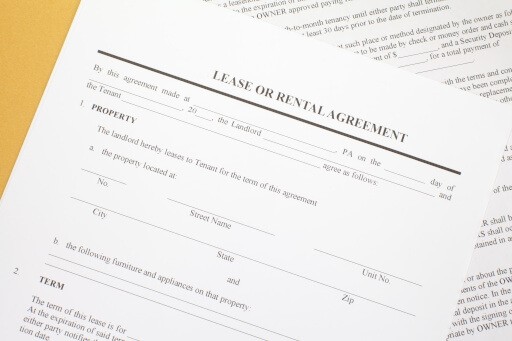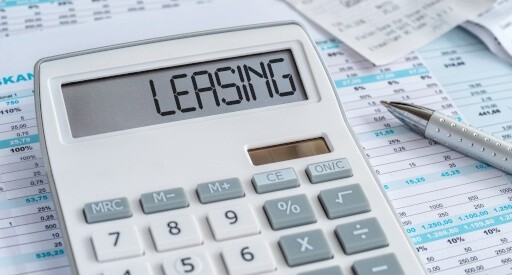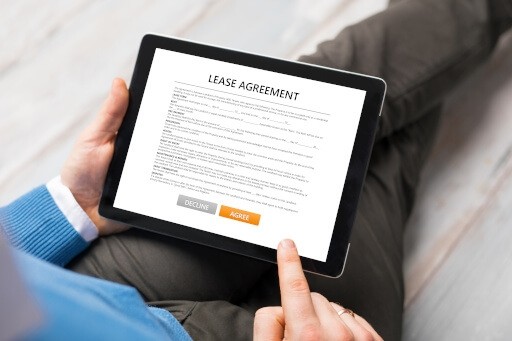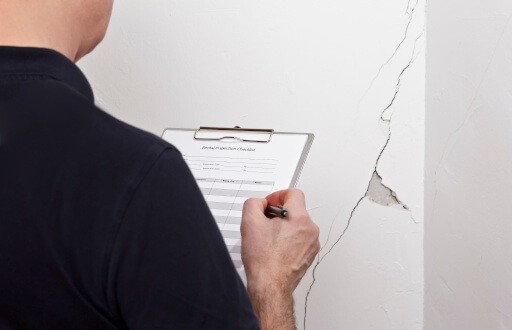
When it comes to your rental property, protecting your investment is always a primary concern. The most effective way of doing this is by establishing clear rules for your tenants.
To be legally binding, these rules should be explicitly outlined in the lease agreement. By signing the lease, your tenant agrees to abide by your house rules throughout their tenancy.
Here’s a list of common rules to consider adding to your lease agreement:
- Timely rent payments and late fees
- Maintenance, repairs, and cleanliness
- Renters insurance
- Pet policies
- Quiet hours
- Lease renewals and notice periods
- Damage deductions from the security deposit
- Consequences of lease breaking
What Is in a Lease Agreement?
Your lease agreement should explicitly outline the terms of renting your property, including your property information, the rent amount, lease duration, security deposit, and any specific house rules you include. Your lease is a legally binding document, so any rules you plan to enforce should be included in the lease.
What to Include in Your Lease
When outlining house rules, consider what will minimize your financial and legal liability for your tenant’s actions. In the lease, clearly state your expectations and the consequences for breaking each rule.
Timely rent payments and late fees
When searching for tenants as a landlord, prioritize those who show a history of paying rent on time, leaving rentals in good condition, and following the lease terms. But part of ensuring on-time rent payments is your responsibility.
A comprehensive lease agreement should define rent due dates, grace period duration (if applicable), the final day to pay rent without incurring late fees, and the corresponding late fee amount. By establishing your expectations for rent payments, you can ensure your tenant understands how and when they should pay rent, translating into consistently on-time rent payments.
Maintenance, repairs, and cleanliness
Covering your rules regarding maintenance, repairs, and cleanliness in the lease is essential to keeping the property in good condition. Can tenants make repairs themselves? What maintenance issues should they contact you for? What's considered emergency maintenance? How often must you enter the property for routine inspections and repairs? These questions and more should be answered in the lease so the tenant knows how to handle maintenance issues. If you expect the property to be thoroughly cleaned and maintained throughout the lease period, clearly state these expectations and any fees your tenant will incur if they don’t abide by your cleaning criteria.
Renters insurance
While certain state laws may not list renters insurance as a requirement, you should consider including it in your lease agreement. In addition to protecting your tenant, renters insurance protects you by reducing your liability for damage or injury.
Talk with a lawyer to determine the terms of a mandatory renters insurance policy, including the appropriate coverage amount and requiring your renter to present their renters insurance policy before they sign the lease.
Pet policies
Whether or not you allow pets in your rental property, you will need to provide a pet policy in the lease. If you don't allow pets, clearly state that the rental has a no-pets policy and list the fee or consequence (such as lease termination) for breaking this policy. If you allow pets but have specific regulations and breed restrictions, clearly state what is and is not allowed in your pet-friendly rental. For instance, you might allow up to three pets in the rental if the pets are of a particular type and size. Also include pet fees, monthly pet rent, and any other specifics regarding pets in this house rule.
It's important to understand that service animals (SAs) and emotional support animals (ESAs) are not classified as pets and are protected under the Fair Housing Act. This means that you cannot discriminate against tenants who require an assistance animal, and you cannot collect extra deposits or rent for an assistance animal.
Quiet hours
Including quiet hours in your lease is important for creating a harmonious living environment in a rental property that's close to neighbors or located in a multi-family building. This encourages respect among tenants and prevents excessive noise disturbances during specified hours. Violations of this policy may include loud music or parties, which are prohibited during the designated quiet hours as stated in the lease agreement.
Quiet hours are typically between 10 p.m. and 7 a.m. on weekdays and 11 p.m. and 8 a.m. on weekends and holidays, but check your local noise ordinance and the quiet hours of other rentals in your area to get a better idea of when you should set your quiet hours. Adding quiet hours to your lease can help manage and prevent noise-related issues with your tenants, helping you maintain a good reputation as a landlord.
Lease renewals and notice periods
It’s standard practice for landlords to require proper notice from tenants for lease renewals and move-outs. To facilitate the lease renewal process, you are required to send a letter to the tenant outlining the terms of their lease renewal. The tenant will then inform you about their decision to renew or not renew their lease.
In case of non-renewal, the tenant must provide you with a notice to vacate. While the amount of notice required is up to you and your state laws, the recommendation is typically a 60-day notice period for long-term leases and a 30-day notice period for short-term or month-to-month leases.
Damage deductions from the security deposit
If you find damage to the property during the move-out inspection, you will need money to make the repairs. That money typically will come from the security deposit, depending on your state laws.
If the cost of the damage exceeds the security deposit, you will need to request payment for damages through a demand letter. The lease clearly states that any damage to the property beyond normal wear and tear will be withheld from the security deposit. To better track your property's condition during the lease term, we suggest using a rental walk-through checklist for both the move-in and move-out inspections.
Consequences of lease breaking
In the case of a tenant breaking the lease early, the consequences should look different depending on the situation.
In most cases, your tenant is financially responsible for some amount of rent. The amount your tenant owes if they terminate the lease early depends on your state laws—some states hold tenants responsible for the remainder of the lease term, while others only require tenants to pay rent until you find a new tenant. Check your state laws before adding an early termination clause into your lease agreement.
However, there are some situations in which a tenant is not liable for the remaining rent. If you fail to provide a safe and comfortable living space as required by law, your tenant has the right to terminate their lease without repercussions.
The Servicemembers Civil Relief Act also excuses tenants from carrying out the remainder of their lease in the case of military deployment. Your tenant is required to give you at least a 30-day notice if they’re leaving for military reasons, but they are not responsible for any remaining rent after they move out.
What to Do If a Tenant Violates the House Rules
Violating the house rules will differ in severity depending on the rule. For instance, if your tenant pays rent late one month, then the punishment will be adding a late fee to their rent payment. If they don't pay rent late again, everything should be fine.
Sometimes, tenants violate the lease by not paying rent for an extended period of time or by violating policies in the lease agreement, such as having pets in a no-pets rental, damaging the rental beyond normal wear and tear, or repeatedly ignoring the lease-mandated quiet hours. If the tenant violates the terms of the lease in a serious manner, you may need to start the eviction process.
Your lease should clearly state the consequences of violating each policy, so your tenant knows what’s expected of them. Laying out all your expectations in a legally binding document can help you avoid financial loss or property damage and make your tenant’s renting experience much smoother.
This article was originally published on Feb. 11, 2021, by Megan Bullock.
FAQs
How do I create a lease?
Apartments.com can help you create a free residential lease agreement that complies with your state and local laws. Our online lease generator is fully customizable, so you can tailor your lease to include your house rules.
What’s the difference between a service animal and an emotional support animal?
A service animal is an animal, typically a dog, that is specifically trained to assist a person with a disability. Some service animals are trained to guide a legally blind person, while others are trained to sense a drop in blood sugar in an owner with diabetes. Service animals offer life-saving assistance.
Emotional support animals, like pets, offer comfort and security to their owners. However, the comfort and security an ESA brings their owner assists with a mental health condition such as depression, anxiety, or post-traumatic stress disorder.
Both SAs and ESAs are working animals, not pets. You cannot collect pet rent or pet deposits for assistance animals.
Can I ask for documentation proving that an assistance animal isn’t just a pet?
Yes, you are permitted to ask for documentation proving that a renter’s assistance animal is more than just a pet. For SAs, that may be a certification document. For ESAs, the documentation will be a letter from a licensed mental health professional, as there is no official ESA registration process.
Can I deny the application of a renter with an assistance animal?
You can deny housing to a renter with an assistance animal for reasons unrelated to their assistance animal, like their credit or rental history. However, declining an application because the applicant has an assistance animal is categorized as discrimination under the Fair Housing Act.
Can I ask a renter not to live with their assistance animal?
No, you generally cannot deny a renter the right to live with their assistance animal. The Fair Housing Act and Americans with Disabilities Act both define assistance animals as a reasonable accommodation for a disability or mental health condition, meaning that refusing to allow a renter to live with their assistance animal or rejecting their application because of their assistance animal is classified as discrimination based on disability.
The only circumstance under which you can deny an assistance animal is if you can prove a renter’s assistance animal would cause a financial burden or significant damage to your rental. However, you should talk with a lawyer before denying an applicant for this reason. Violating the Fair Housing Act by wrongfully refusing to accommodate an applicant’s assistance animal can land you in court.











